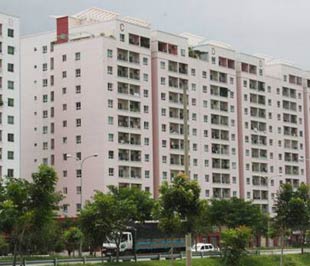
| New tax cramps real estate market | |
A new capital gains tax effective late last month has hit the Ho Chi Minh City property market hard, with many realtors reporting sharp declines in transactions. Nguyen Thanh Dat, director of Hung Hung Thinh Real Eastate Company, said the firm is selling about 1,000 land lots and 500 apartments at 100 residential projects in the city.
The number of transactions this month has dropped by 80 percent from a month ago, Dat said, blaming the business slowdown on the new capital gains tax.
Another company with four real estate exchanges around the city said not a single transaction has been recorded this month.
Property developers in Vietnam are allowed to raise funds from their buyers to build their projects. In fact almost all new residential projects are funded with buyers’ advances. But starting September 26, if a buyer wants to transfer the right to own a property in the future to another person, the capital gains from the transfer will be subject to a tax rate of 25 percent. If it is impossible to calculate the taxable income, a tax of 2 percent of the value of the transaction will be imposed.
Huynh Tan Gia Thanh, general director of The Gioi Dat Company, said land prices at the An Phu-An Khanh Project in District 2, for instance, were only about VND5 million per square meter in 2002.
Now land at the project can be sold for VND35 billion, which means the capital gain of VND30 million per square meter will be taxed 25 percent, Thanh said. But the high tax rate is not the only factor that causes the market to slow down. Many people have said they find the way the new tax is calculated very confusing.
In District 1, for example, taxpayers can choose from the two options – a 25 percent tax on capital gains or a 2 percent tax on the transaction value. Meanwhile, tax officials in Nha Be District determine how much taxpayers will pay on a case by case basis.
Tax agencies in districts 5 and 8 have even stopped receiving property transfer applications as they wait for guidance from higher authorities. | |
| ThanhNienNews |
